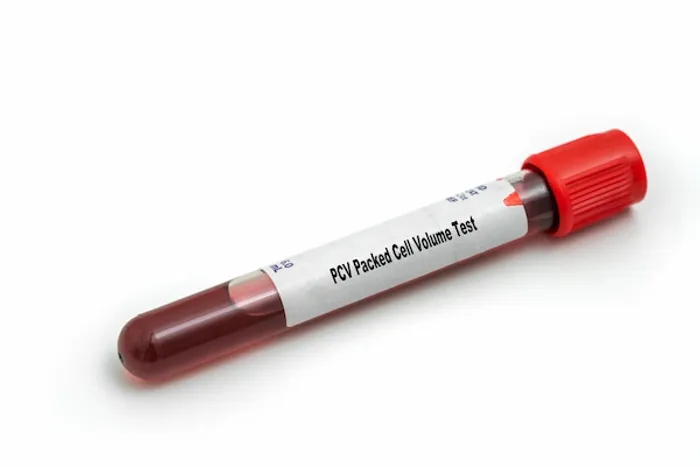PCV Medical Meaning and Importance
Know what PCV is, its significance, range, what to do when it's abnormal, symptoms and causes for fluctuations. Learn about managing PCV and how to get the test done.


When you visit your doctor or get a blood test, you might come across the term PCV in your reports. But what exactly does PCV mean, and why is it important for your health? Let’s break it down in simple terms so you can understand its role in keeping you healthy.
What is PCV?
PCV (Packed Cell Volume), also known as hematocrit (Hct), is a blood test that measures the percentage of red blood cells (RBCs) in your blood. These cells are crucial because they carry oxygen from your lungs to the rest of your body and bring carbon dioxide back to your lungs to be exhaled.
Think of your blood as a mixture of different components:
- Red blood cells (RBCs) – Carry oxygen.
- White blood cells (WBCs) – Fight infections.
- Platelets – Help in blood clotting.
- Plasma – The liquid part of blood.
PCV tells you how much of your blood is made up of RBCs. A normal PCV level ensures that your body gets enough oxygen to function properly.
Why is PCV Important?
Your PCV level helps doctors understand if you have conditions like:
- Anaemia (low RBCs) – Can cause fatigue, weakness, and shortness of breath.
- Dehydration – High PCV may mean your blood is thicker due to lack of fluids.
- Polycythemia (high RBCs) – Can increase the risk of blood clots.
- Lung or heart diseases – Affect oxygen levels in the blood.
By checking your PCV, doctors can diagnose and monitor these conditions early, helping you stay healthy.
Normal PCV Range
The normal PCV range varies slightly by age, gender, and even altitude:
- Men: 38.8% – 50%
- Women: 34.9% – 44.5%
- Newborns: 55% – 68% (higher due to fetal haemoglobin)
If your PCV is too high or too low, your doctor may recommend further tests to find the cause.
Consult a Top General Physician
Symptoms of Abnormal PCV Levels
Low PCV (Anaemia or Blood Loss)
- Cold hands and feet
- Fatigue and weakness
- Pale skin
- Shortness of breath
- Dizziness
High PCV (Dehydration or Polycythemia)
- Headaches
- Blurred vision
- Itchy skin (especially after a warm bath)
- Reddish or purplish skin tone
- Increased risk of blood clots
What Causes Abnormal PCV Levels?
Low PCV Causes:
- Iron deficiency (the most common cause of anaemia)
- Vitamin B12 or folate deficiency
- Chronic diseases (kidney disease, cancer)
- Blood loss (heavy periods, ulcers, injuries)
- Bone marrow disorders
High PCV Causes:
- Dehydration (not drinking enough water)
- Smoking (reduces oxygen levels, increasing RBC production)
- Living at high altitudes (body makes more RBCs to compensate for low oxygen)
- Lung or heart diseases
- Polycythemia vera (a rare blood disorder)
How to Maintain Healthy PCV Levels?
If Your PCV is Low (Anaemia):
- Eat iron-rich foods: Spinach, lentils, red meat, eggs, and fortified cereals.
- Increase vitamin C intake: Helps iron absorption (oranges, tomatoes, bell peppers).
- Take supplements (if prescribed): Iron, B12, or folic acid.
- Manage blood loss: Treat heavy periods or ulcers with a doctor’s help.
If Your PCV is High (Polycythemia or Dehydration):
- Stay hydrated: Drink plenty of water.
- Quit smoking: Improves oxygen levels.
- Exercise regularly: It helps blood circulation.
- Donate blood (if advised): Reduces excess RBCs in polycythemia vera.
When Should You Get a PCV Test?
Your doctor may recommend a PCV test if you:
- Feel unusually tired or weak
- Have pale skin or shortness of breath
- Experience frequent dizziness
- Have a family history of blood disorders
- Are pregnant (to check for anaemia)
How is PCV Tested?
A simple Complete Blood Count (CBC) test checks your PCV along with other blood components. It involves a small blood sample, usually taken from your arm.
Final Thoughts
PCV is a key indicator of your blood health. Whether it’s too high or too low, understanding your PCV levels helps in early detection and treatment of potential health issues. If you experience symptoms like fatigue, dizziness, or unusual skin changes, consult your doctor and get tested.
Consult a Top General Physician
Consult a Top General Physician

Dr. Lakshmi Sanjitha Kakani
General Physician/ Internal Medicine Specialist
6 Years • MBBS, MD (General Medicine)
Visakhapatnam
Apollo 24|7 Clinic - Andhra Pradesh, Visakhapatnam

Dr D M Karthik
General Practitioner
4 Years • MBBS, Fellowship in Diabetes Mellitus, Advance certificate in Diabetes Mellitus, Derma Nutrition Certification
Visakhapatnam
Apollo 24|7 Clinic - Andhra Pradesh, Visakhapatnam

Dr Divya Lekha Gunta
General Practitioner
10 Years • MBBS, MD (Pathology)
Visakhapatnam
Apollo 24|7 Clinic - Andhra Pradesh, Visakhapatnam

Dr. Siri Nallapu
General Practitioner
5 Years • MBBS
Hyderabad
Apollo 24|7 Clinic, Hyderabad

Dr. Shaik Abdul Kalam
General Practitioner
3 Years • MD (Physician)
Visakhapatnam
Apollo 24|7 Clinic - Andhra Pradesh, Visakhapatnam
(150+ Patients)
Consult a Top General Physician

Dr. Lakshmi Sanjitha Kakani
General Physician/ Internal Medicine Specialist
6 Years • MBBS, MD (General Medicine)
Visakhapatnam
Apollo 24|7 Clinic - Andhra Pradesh, Visakhapatnam

Dr D M Karthik
General Practitioner
4 Years • MBBS, Fellowship in Diabetes Mellitus, Advance certificate in Diabetes Mellitus, Derma Nutrition Certification
Visakhapatnam
Apollo 24|7 Clinic - Andhra Pradesh, Visakhapatnam

Dr Divya Lekha Gunta
General Practitioner
10 Years • MBBS, MD (Pathology)
Visakhapatnam
Apollo 24|7 Clinic - Andhra Pradesh, Visakhapatnam

Dr. Siri Nallapu
General Practitioner
5 Years • MBBS
Hyderabad
Apollo 24|7 Clinic, Hyderabad

Dr. Shaik Abdul Kalam
General Practitioner
3 Years • MD (Physician)
Visakhapatnam
Apollo 24|7 Clinic - Andhra Pradesh, Visakhapatnam
(150+ Patients)